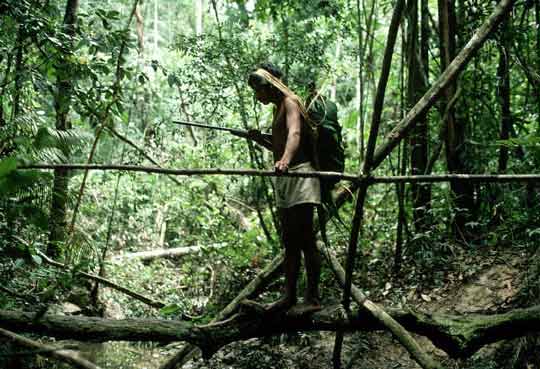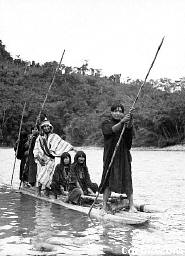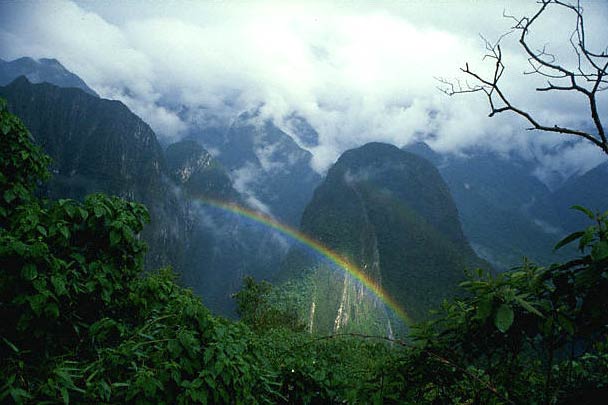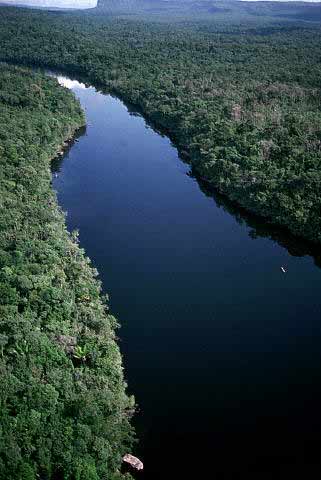
Hugh McCarthy was a
man possessed. The 32-year-old rented an inexpensive apartment
in Rio and studied all the accounts of Colonel Fawcett he could
get his hands on. Several months later, he traveled to a small Indian settlement
on the eastern fringe of the unexplored region of Matto Grosso
and met Reverend Jonathan Wells, a missionary - placed there to enforce his
religious faith upon the people there, just like the Spaniards
did before him...
McCarthy and Wells became good friends. Wells tried to convince McCarthy that the area was occupied by hostile head-hunter Indians but his words of warning fell on deaf ears. Realizing McCarthy was determined to find Fawcett's lost city, Wells gave McCarthy a gift of seven carrier pigeons to take with him on his adventure.
The two men worked out a system of communicating with shorthand so they could keep in touch during Hugh McCarthy's journey. McCarthy agreed to send back a report to Wells once a week, or whenever possible.
With
some supplies, food, an automatic pistol, rifle, three hundred
rounds of ammunition, and Wells' seven carrier pigeons in seven
separate wicker baskets, Hugh McCarthy disappeared upstream.
McCarthy's
first carrier pigeon reached Wells six weeks later. It was numbered as
the third letter he had sent (the first two never reached Wells.)
McCarthy wrote:  "I
am still quite ill from my accident, but the swelling in my leg
is gradually receding. Had it not been for these friendly Indians
and especially the girl, Tana, my body would now be lying in
an unmarked grave. The Indians have taken me into their hearts
and I could be happy living here for the rest of my life.
"I
am still quite ill from my accident, but the swelling in my leg
is gradually receding. Had it not been for these friendly Indians
and especially the girl, Tana, my body would now be lying in
an unmarked grave. The Indians have taken me into their hearts
and I could be happy living here for the rest of my life.
"When I regained consciousness, I found myself looking into the face of this beautiful girl. Her pale blue eyes made me think I had already died and gone to heaven. I have changed her name to Heather and am now teaching her English. Tomorrow I leave to continue my mission. I am told that the mountains which I seek are only five days away. God keep you. Hugh."
So Hugh had had some kind of an accident, but at least he was still alive.
The fourth letter never reached Wells, but six weeks later, the fifth (5) carrier pigeon arrived at the mission. Wells' hands must have been shaking as he read the note.
"I have reached the snow-capped mountains, but am in dire circumstances. Long ago, I abandoned my canoe and threw away my rifle as it is impractical in the jungle. My food supply has been exhausted and I am living on berries and wild fruits.
"The weather has turned cold, and at night I am unable to sleep. I could turn back, as I know Heather is waiting for me, but having come this far nothing can stop me from scaling these peaks to either final victory or merciful death. Somewhere in these snow-capped peaks I hope to find Fawcett's Lost City of Gold. But should I fail, it was at least a glorious adventure. Pray for me."

The days and weeks that passed must have been filled with agonizing anticipation for Wells. Three long weeks later, the last (7th) carrier pigeon returned. It was only the third to return.
The note the pigeon carried read: "I know that the soft cold hands of death will touch me shortly, and in these last moments I can but pray that all of the pigeons I sent out arrived safely. Writing is difficult and my lucid moments are few. But what a gorious way I have chosen to leave this world. I hope my map arrived safely by carrier pigeon number six, so that you, of all people in the world will know the location of this City of Gold.
"It is magnificient and unbelieveable, with a golden pyramid and exquisite temples. With God's help, you will soon be able to lead an expedition of archaeologists back to this most wonderful of all cities since the beginning of Time and its treasures can be preserved for generations to come. My work is over and I die happily, knowing that my belief in Fawcett and his lost City of Gold was not in vain. Hugh."
Had Hugh McCarthy accomplished the impossible?!
With Hugh McCarthy's three letters in hand, Wells rushed down to the river and canoed to a nearby town where he charted a plane to Rio de Janeiro, hoping to interest the authorities to launch an expedition to find McCarthy and save him. But the Matto Grosso region is very vast and there are four (4) different mountain ranges in the area, NOT one. To make matters worse, there was no historical evidence that any such lost city of gold had ever existed. As a result, it was concluded that Hugh McCarthy had lost his mind, and his lost city of gold was that of a delirious state of mind :\
But Hugh McCarthy's efforts to find these legendary lost cities and civilizations in South America did NOT die here.
On March 3, 1972, Karl Brugger, a German journalist, met an Indian chieftan named, Tatunca Nara, and after a detailed interview with him, the two set out on an expedition up the Amazon River to the secret city of Akakor!

|
|
|
Images purchased from corbis.com